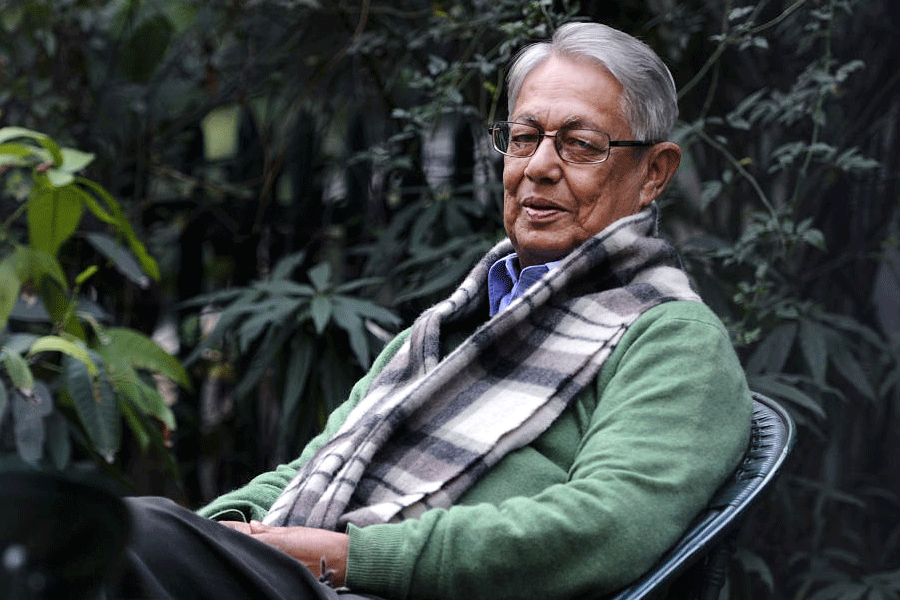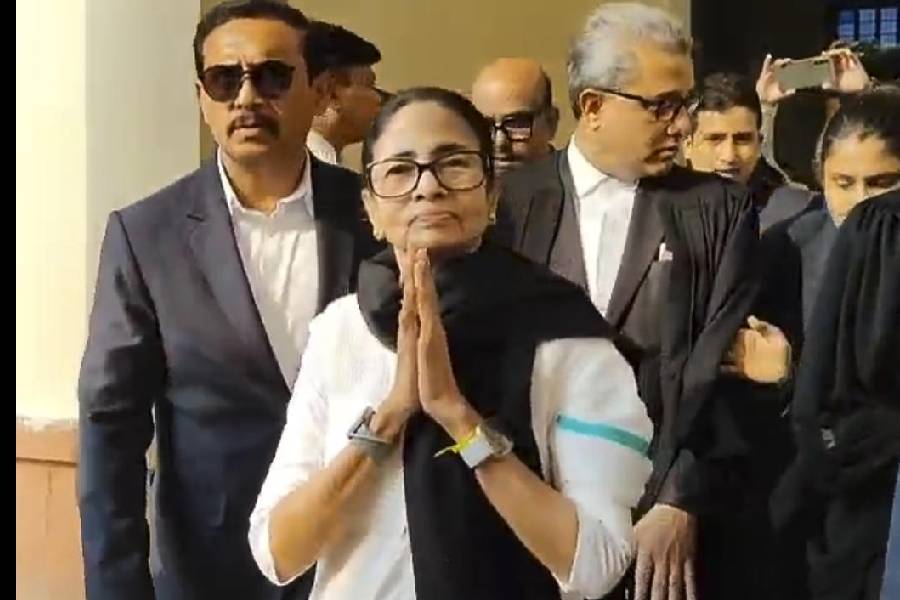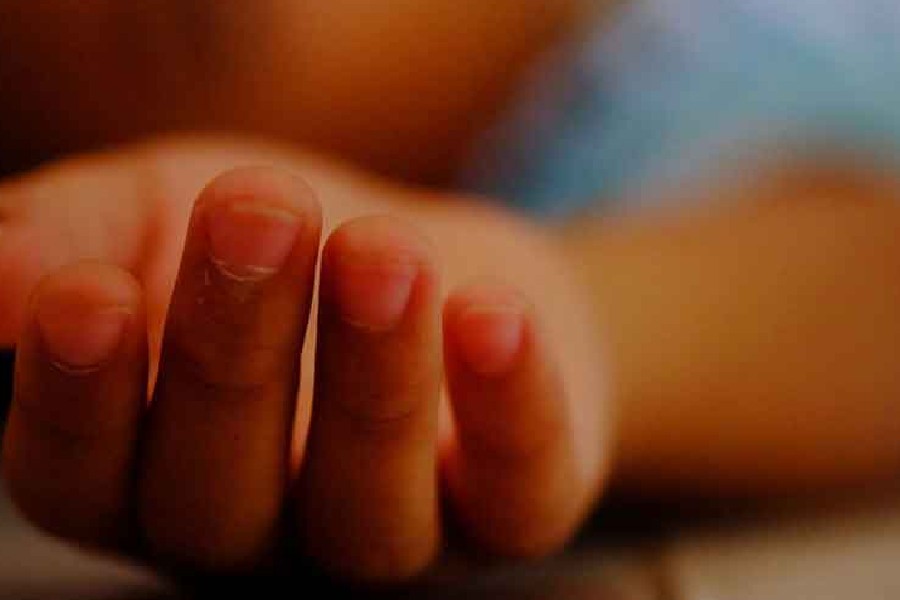
Wow, that was the shortest international flight ever. By the time I strapped on my seat belt, it was time to land!” were Deepika Padukone’s first words to t2 at the Calcutta airport on Sunday evening. Bollywood’s heroine number one, flying in from Dhaka, was in Calcutta to attend a special dinner with t2 on Sunday evening. Dressed in distressed denims, a blue and black shirt and John Lennon-inspired mirror Aviators, Deepika looked fresh and fetching, making fellow passengers and fans steal furtive glances at her.
At night, it was blue for Deepika once more — stunning in a blue and gold Anarkali. “It’s a Sabya… pretty, na?” smiled our Piku, before settling in for a chat with t2 between ITC Sonar and the dinner destination.
Deepika, we love having you in Calcutta. We hope the feeling is mutual!
Oh, absolutely! (Smiles) Calcutta is one city that’s been a part of my life and my journey even before I became an actor. I think what brought me here very often was a lot of the modelling shows that I used to do and even in that stage of my career, I was signed on by a leading jewellery brand, based out of Calcutta, to be their brand ambassador. You know, one of my closest friends, someone I have grown up with, has lived a large part of her life in Calcutta. So yes, lots of connect with Calcutta in that sense. And then of course, work has always brought me to Calcutta. I feel very comfortable here… I feel very secure here and I think ‘comfort’ is the word that rightly sums up my equation with Calcutta. There are some cities you feel an instant connection with and, for me, Calcutta is definitely one of them (smiles).
The longest time you spent in Calcutta were the two weeks shooting Piku last November and then you were back in January for a few days with Imtiaz Ali for Tamasha. What were your impressions of the city?
What made my stay in Calcutta during Piku even more special last year was that I was surrounded by people who had so much of a Calcutta connect. Like Amitji (Bachchan) who’s lived here… he started his career here... it was not an acting job. I can’t remember the name of the company, though he did tell me… (thinks)

Bird and Co…
Oh yes, now I remember! (Smiles) And then, Shoojit (Sircar, the director of Piku) actually lives here (in Salt Lake). And I think that made it so much more exciting for me because to explore the city with people who not only lived here, but who also have a passion for it, was a different kind of an experience. Through them I saw Calcutta, but not in the usual touristy way… my discovery of Calcutta was a lot more personal. So much so that when I came back for Tamasha two months later, I felt that I was doing the same thing! (Laughs) I was showing Imtiaz and Ranbir (Kapoor) around like a pro… sorry, Ranbir was not here (smiles)… but showing Imtiaz and the team around like ‘I know this city and now I will show you this city’ (smiles)… it was almost like that. It was almost a sense of ownership.
Calcutta is very happy with your spot-on Bengali pronunciation in Piku. How did you manage that?!
I am so glad, you know! (Laughs) I can’t even begin to tell you how nervous I was about that. As an actor, these are the things you have to take care of. I am so happy because hearing it from people who are not familiar with the language is one thing, but to hear it from so many Bengalis — just like you — has made it so special. In fact, in the first one or two screenings for Piku in Bombay, there were a lot of Bengalis — from the industry and outside — who were present and one of the first things they said to me was how good my Bengali pronunciation was. In fact, a lot of them even went up to Shoojit and said: ‘It’s not possible… you must have definitely got a Bengali dubbing artiste to dub her Bengali lines!’ (Laughs) And Shoojit was like: ‘Nooo, she’s said it all herself’. So now when I hear this, I feel happy (smiles).
The success of a film is nothing new to you…
Touchwood, touchwood… give me some wood! (Laughs)
…but what have these three weeks been like since Piku’s release and the all-round appreciation it has met with?
Overwhelming, you know. A classic example was when I landed here in Calcutta this afternoon and the person from the airline who was there to receive me said: ‘Ma’am, I loved you in Piku!’ That’s the first thing he said, even before greeting me (laughs). That’s what I live for, you know… that’s what I work for. The love, the appreciation… and especially if it’s for a film that’s special to you as an actor as Piku is for me.
See, every film will be special… that’s why you do the films that you do. From all the films that you are offered, you narrow it down to a certain number of films because you feel a connect with them. It could be the character… the process of making the film… you keep getting more and more attached to the material. And obviously when the film releases, you hope that the audience feels the same way for your film the way you feel for it.
When it happens — especially at the abundant scale in which it has happened for Piku — there is no feeling better than that feeling (smiles). So much so, in the first week itself, picture hamare haath se bhi nikal gaya, you know (smiles)… it became so big. The audience sort of took ownership of the film and that’s why it’s done the kind of business that it’s done. It was all about people telling other people: ‘Go watch this movie’. It was parents telling their children to watch Piku or children forcing their grandparents to do so (smiles). It happened so, so organically that I feel that the audience has associated so much with the film, its situations and characters that they almost feel like it’s their life… their story.
Piku was offered to you when you were riding high after four back-to-back blockbusters. What were the trigger points about this intimate, slice-of-life film that made you sign on?
For me, the scale of a film has never really been a criterion when it comes to doing a film. When I started doing interviews before the release of Piku, people came up to me to say: ‘It’s a very brave choice’. And I was like: ‘Is this what people are thinking, because I never considered doing Piku to be a brave choice in any way’. I chose Piku the way I would have chosen any of my other films.
I think the two trigger points for me really were the relatability… like the way the audience related to the film, I did too because this is what happens in all our homes… whether it’s yours or mine. I also identified a lot with the socio-economic background of these characters and the way they are culturally… the way they are so progressive and yet so rooted to Indian culture. My family is totally like that. It was that one narration Shoojit gave me of the very first scene (when Piku and Baba are arguing)… it sort of summarised the whole film for me… it summarised the characters and what I should expect from the film. It was funny, it was relatable… it made me cry but it also brought a smile to my face.
Also, a major trigger point was that it was being directed by Shoojit because good material should always be in the hands of a good director. And having watched Vicky Donor and even when he brought Piku to me, I could tell that he had full control over his material and that he could do justice to it. There are always two aspects to making a film… you can have a great script, but it also needs to be brought alive by a good director for it to come across in the way that it should. So Shoojit directing some really great material, coupled with something I could really relate to, is the reason I would say I not only jumped, but dived, into Piku! (Laughs)
When you speak of relatability, it may not be as exaggerated or quirky, but is the dad-daughter dynamic in Piku in any way a reflection of the relationship you share with your father, Prakash Padukone?
Yes! My dad and I also share the same equation… which is progressive, but also rooted at the same time. There are certain things in our family which are a given, no matter how successful we are or how modern we become. Right from my childhood, I have been taught certain things… culture, manners, traditions…. That’s such an inherent part of my and my sister Anisha’s growing up. That’s something that will never leave my system… the values my father has given me. I feel it a lot more internationally… when I go abroad, that’s when you feel it even more — the difference in culture — than you do when you are in the country. What is unique and special to us as people as our parents have taught us versus them and their culture.
Speaking about family, we have to tell you that the Tanishq ad with your mom Ujjala is awesome. She seems such a natural… maybe she could do a film with you now!
(Laughs out loud) Tell her that! She was very, very nervous to begin with, but then she’s a rockstar (smiles). She knocked it off in just one day! She had more physical work than me… the film is more from her point of view. It sure has my voiceover, but the montages are more hers. She was so calm, you know, so fresh even at 4 in the morning! The family was there, sitting by the monitor and giving her moral support (smiles).
In the ad, you say that despite your success, you are still the same little girl for your mother. Do you miss the days when you were not famous and could do many things that you can’t now?
I don’t actually, because I feel that I can still do that (smiles). Yes, I may be a little bit of a nuisance for the people around me because crowds will gather and everyone will want to get a little up close, but that doesn’t stop me from doing it. I guess the only reason why I do it a little less now is that I don’t want to inconvenience people around me. But at the end of the day, if I want to go grocery shopping, I will still do that… if I want to go to that idli shop in Bangalore where I have been going ever since I was a child, I will still do that….

The only difference being that you will be signing 100 autographs and posing for 500 selfies!
(Laughs out loud) Fair enough, fair enough. I read this line recently which said that ‘between all the goals that we want to achieve and the targets that we set for ourselves, there’s something called life that has to be lived’ (smiles). I think that really sums up what I am trying to say here.
Coming back to Piku, can you pick your favourite scene from the film?
Oh, there are so many! Of course, the scenes between me and Amitji will be the obvious choices, but I also loved the road trip sequences. That’s because it was during those scenes that you got to see a different side to Piku… yes, she is always on the edge, yes her dad frustrates her all the time, yes, her personal life is going nowhere… but in those scenes, you saw Piku as a vulnerable and sweet girl, especially when she was with Rana (Irrfan Khan). That scene in Calcutta when Rana and Piku are talking about Baba and marriage and eating rolls… I thought that was so natural and relatable… just like an everyday conversation.
Ranveer Singh has said that Piku is your best work. Would you agree?
(Smiles and pauses) I would definitely say it’s one of my best, but then there is also Cocktail, Ram-Leela, Yeh Jawaani Hai Deewani. I think Piku has become everyone’s favourite because it isn’t larger-than-life cinema… Piku and Baba could be your relatives, your neighbours or even you (smiles). For me, Piku would surely be one of those films that looking back, 20 or 30 years later, I would be so, so proud of.
If you had to prepare a showreel picking three moments from any three films of yours, which would they be?
Only three, ha? (Smiles) It would be a little more than three, but let me pick films here, rather than moments. It would definitely be Cocktail because that brought about an entire change in my career… then, of course, Piku. I will definitely throw in Chennai Express and Ram-Leela because of the directors (Rohit Shetty and Sanjay Leela Bhansali) I got to work with. If I am sending my showreel internationally, then I would also probably throw in a Finding Fanny (laughs).
Piku and now Tanu Weds Manu Returns have become the biggest hits of the year. Both films have women protagonists. Anushka Sharma recently told us that Bollywood films are funded on the basis of who the hero is, not who the heroine is. Do you see that changing anytime soon?
Honestly, I personally don’t understand money and the concept of funding. I don’t understand the business of filmmaking. What I can definitely say — and I have been saying this for over a year now — is that it’s amazing to see content-driven films doing so well. Most importantly, I have been saying for a long time that it’s a very, very exciting time for the industry now, what with the diverse kind of films that are being made, the kind of directors making them, the kind of opportunities that our writers are getting…. You just spoke about funding, you know a lot of writers have actually come up to me and thanked me because with so much of the credit for the success of Piku being given to its writer (Juhi Chaturvedi), producers are now willing to give writers at least the chance of that first meeting… something that many of them didn’t have till now. I think the writers in our films are not nurtured enough. At the end of the day, a good film is driven by good content and that comes from our writers.
Earlier in the year, your Vogue Empower video was severely criticised. Did it take you by surprise because everyone knows that the intention behind it was noble…
I wouldn’t say I was surprised or thrown off… I was a little disappointed for sure because I don’t really think any of us thought it would go down this way. I think somewhere we opened it up in such a way that it became a victim of interpretation and that’s what led to people having an opinion about it. Fair enough… I am completely okay with that. My only take on this is that, as you have rightly pointed out, the larger intention was sort of missed and that’s where I was a bit disappointed (smiles). But that’s okay… I live to fight another day (smiles).
Finally, was the decision to speak out about your battle with depression a difficult one to make since in India we still shy away from first acknowledging and then speaking out about these things?
No, not at all. I went through so much, mentally, last year and I came out a much stronger person. When I came out of it, I realised how many more people are suffering and that they need help. One of the things that doesn’t really help is the taboo… that even if you are suffering like hell, you have to be hush-hush about it. The reason I spoke out was to do my bit to remove the stigma that is attached to mental health. I am a survivor and I felt that there was a need to tell people like me that there is hope, don’t give up. I didn’t, even for a second, think of the consequences and neither did the people who are close to me. Yes, there were other people who said: ‘What about endorsements? Are people going to back out? What are they going to think?’ But no, I stuck to my decision and the immediate thought was that I needed to reach out to those who are suffering in much the same way that I have suffered (smiles).

Piku is/is not Deepika’s best act because…. Tell t2@abp.in










